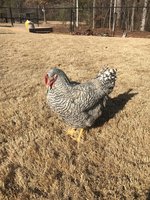- Thread starter
- #21
- Dec 25, 2017
- 25
- 39
- 101
New Year's Day update. Thanks again for all the info from everyone. My Barred Rock (who is currently living in my basement), seems to be improving. We were able to get outside in the sunshine a little bit a couple of days in a row. I tried creating a dust bath to see if she would scratch and roll in that in the sun, to maybe try to help the itching, but she just stood in it. So I shook handfuls of it in her feathers to try to help. Then she would shake it out. She is eating and getting stronger, pooping a lot more, but occasionally it is diarrhea. I have been feeding her feed wet with an electrolyte mix of sugar, baking soda, and salt that I found on line. I was hoping that would help ensure she is getting the liquids she needs plus a little boost. Since the diarrhea, I've tried to give her just plain water and dry food but she doesn't eat as much with the dry (I mean who would  so, right now we are in watch and wait mode. She is warm and well feed and talked to daily, but she still keeps her eyes closed 99% of the time. She will open them briefly if startled but closes them right back. I haven't been able to get a good look at them and haven't forced them open to examine. Don't want to freak her out. If she moves to far away from the food, she can't find it on her own. So at this point, I don't really know what to do next. Other than the closed eyes, acting very timid about walking any where, she seems to be doing better. Any suggestions on what to do next?
so, right now we are in watch and wait mode. She is warm and well feed and talked to daily, but she still keeps her eyes closed 99% of the time. She will open them briefly if startled but closes them right back. I haven't been able to get a good look at them and haven't forced them open to examine. Don't want to freak her out. If she moves to far away from the food, she can't find it on her own. So at this point, I don't really know what to do next. Other than the closed eyes, acting very timid about walking any where, she seems to be doing better. Any suggestions on what to do next?
 so, right now we are in watch and wait mode. She is warm and well feed and talked to daily, but she still keeps her eyes closed 99% of the time. She will open them briefly if startled but closes them right back. I haven't been able to get a good look at them and haven't forced them open to examine. Don't want to freak her out. If she moves to far away from the food, she can't find it on her own. So at this point, I don't really know what to do next. Other than the closed eyes, acting very timid about walking any where, she seems to be doing better. Any suggestions on what to do next?
so, right now we are in watch and wait mode. She is warm and well feed and talked to daily, but she still keeps her eyes closed 99% of the time. She will open them briefly if startled but closes them right back. I haven't been able to get a good look at them and haven't forced them open to examine. Don't want to freak her out. If she moves to far away from the food, she can't find it on her own. So at this point, I don't really know what to do next. Other than the closed eyes, acting very timid about walking any where, she seems to be doing better. Any suggestions on what to do next?






